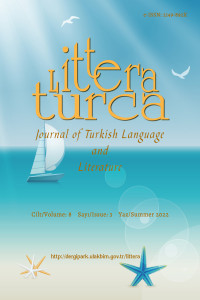BAŞKİŞİ ÜZERİNDEN ATTİLÂ İLHAN’IN ZENCİLER BİRBİRİNE BENZEMEZ ROMANINDA KİMLİK: YABANCILAŞMA VE AİDİYETSİZLİK
‘Kim’ ve ‘ne’ olma durumunun belirleyicisi olan ‘kimlik’ kavramıyla genel olarak psikoloji, sosyoloji ve felsefe ilgilenir. Özünde bireyi ve toplumu konu edinen edebiyat sanatı ve bilimi de ‘kimlik’ kavramının imkanlarından yararlanır. Edebî eserde anlatılan insan ve toplumun kimliği, kimlik kazanımı, kimlik değişimini; bu insan ve toplumun kimliğinin psikolojik, sosyolojik ve felsefî hallerini ve bütün bunları dile getiren anlatıcının kimliğini incelemek edebiyat biliminin çalışma alanlarından biridir. Attilâ İlhan’ın ikinci romanı Zenciler Birbirine Benzemez, roman boyunca kendini yetiştiği topluma ait hissetmeyen, yaşamının anlamını sorgulayan; dolayısıyla tip olarak değerlendirilebilecek Mehmet Ali’nin kendini bulmak için İstanbul’dan Paris’e yolculuğunu ve Paris’te bu arayışla geçen günlerini anlatır. Bu çalışmada; yabancılaşma, aidiyetsizlik, arayış duyguları içindeki Mehmet Ali’nin kimlik özellikleri, belirlediğimiz kimlik göstergeleri (dil, isim, giyim ve dış görünüş, eşya/nesne, davranış kalıpları) ve kimliği etkileyen unsurlar (mekân, zaman, ötekiler) ile değerlendirmiş/ortaya konmuştur.
Anahtar Kelimeler:
Attilâ İlhan, roman, kimlik, aidiyetsizlik
IDENTITY FROM THE PROTAGONIST’S PERSPECTIVE IN THE ‘ZENCILER BIRBIRINE BENZEMEZ’ by ATTILA ILHAN: Alienation and rootlessness
Psychology, sociology and philosophy are generally concerned with the concept of 'identity', which is the determinant of 'who' and 'what'. Being essentially concerned about the individual and society, literary art and science, also make use of the possibilities the identity concept. Literature studies cover the identity of the human and society described in the literary work, identity gain, and identity change. Examining the psychological, sociological, and philosophical aspects of the identity of this human and society, as well as the identity of the narrator who expresses all of these, is one of the fields of study. Attilâ İlhan's second novel, Zenciler Birbirine Benzemez, tells the journey of Mehmet Ali, who can therefore be considered a type, does not have the sense that he belongs to the society in which he grew up, and questions the meaning of his life throughout the novel, during his trip from Istanbul to Paris to find himself and his days spent in Paris with this soul searching. In this paper the identity characteristics of Mehmet Ali, who has feelings of alienation, lack of belonging, and seeking, have been evaluated/revealed with the help of identity indicators (language, name, clothing and appearance, goods/objects, behavior patterns) and factors affecting the identity (space, time, others).
Keywords:
Attilâ İlhan, novel, identity, rootlessness,
___
- ALVER, Köksal (2006). “Edebiyat ve Kimlik”. Bilgi Sosyal Bilimler Dergisi. 2: 32-42.
- ANIK, Mehmet (2012). Kimlik ve Çokkültürcülük Sosyolojisi. İstanbul: Açılım Kitap.
- ARSEVEN, Tülin (2014). “Attilâ İlhan'ın Romanları ve Romancılığı”, Attilâ İlhan Armağanı: Kaptan’a Saygı İle…, ed. Yakup ÇELİK. Ankara: T.C. Kültür ve Turizm Bakanlığı Yayınları. 319-364.
- AŞKIN, Muhittin (2007). “Kimlik ve Giydirilmiş Kimlikler”. Atatürk Üniversitesi Sosyal Bilimler Enstitüsü Dergisi. 10 (2): 213-220.
- ATAK, Hasan (2011). “Kimlik Gelişimi ve Kimlik Biçimlenmesi: Kuramsal Bir Değerlendirme”. Psikiyatride Güncel Yaklaşımlar: 163-213. www.cappsy.org/archives/vol3/no1/ [erişim tarihi: 10.1.2021].
- BİLGİN, Nuri (2007). Kimlik İnşası. İzmir: Aşina Kitaplar.
- FORSTER, Edward Morgan (2001). Roman Sanatı. çev. Ünal Aytür. İstanbul: Adam Yayınları.
- İLHAN, Attilâ (1981). Zenciler Birbirine Benzemez. İstanbul: Karacan Yayınları.
- MORAN, Berna (2002). Edebiyat Kuramları ve Eleştiri. İstanbul: İletişim Yayınları.
- ÖZHER, Sema (2009). Romancı Yönüyle Attilâ İlhan. İstanbul: Akçağ Yayınları.
- SÖZEN, Edibe (2019). Kimlik. İstanbul: Profil kitap.
- Yayın Aralığı: Yılda 4 Sayı
- Başlangıç: 2015
- Yayıncı: Bahir SELÇUK
Sayıdaki Diğer Makaleler
MÜSTAKİM MUSTAFA NİYÂZÎ’NİN SOHBETÜ’L-GÂYE İSİMLİ ESERİNDE SAYI SEMBOLİZMİ
YÛNUS EMRE ŞİİRİNDE SİMGE VE SİMGECİLİK
İSHAKZÂDE ZUHÛRÎ’NİN MEKTÛBÂT ADLI ESERİNE DAİR
EBU’L BEKÂ EL-KEFEVÎ’NİN TUHFETÜ’Ş-ŞÂHÂN’INDA BULUNAN MANZUM BİR NASİHATNAME: NESÂYİH-İ MÜLÛK
MUHAMMED RÂGIB VE İKİ TASAVVUFİ RİSALESİ: PEND-İ SÂLİKÂN VE TUHFE-İ DERVÎŞÂN
SULTAN II. MURÂD’IN “ŞERH EYLEMEZ” REDİFLİ GAZELİ’NİN ŞERHİ
Gencay ZAVOTÇU, Melike Aslıhan EKŞİ
VAHÎD MAHTÛMÎ DİVANINDA DENİZCİLİK TERİMLERİ
DİL VE EDEBİYAT ARAŞTIRMALARINDA AHLAK VE YÖNTEM
Nazlı ESER AYDIN, Fikret USLUCAN
